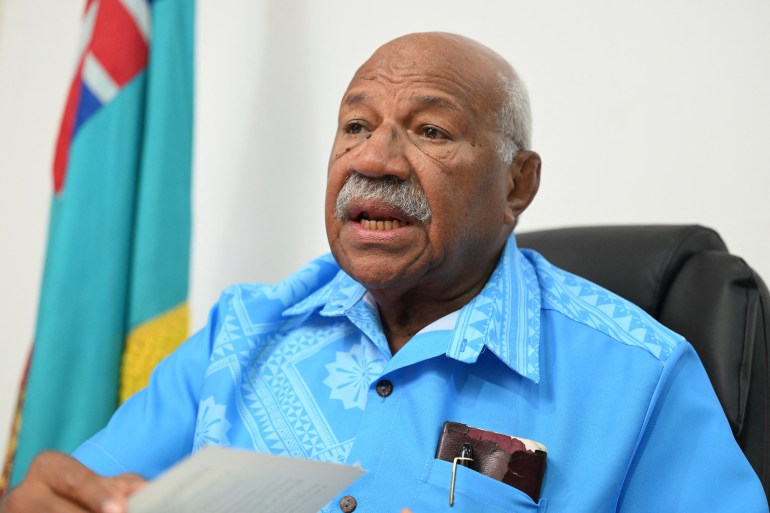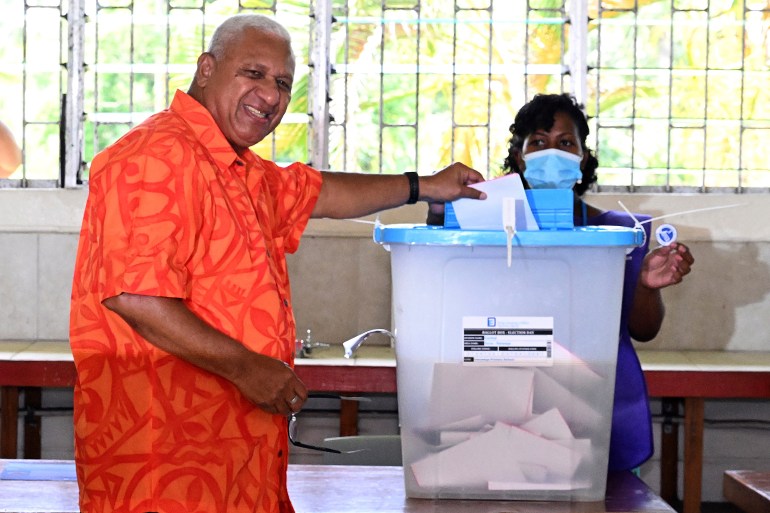Fiji’s opposition lodges complaint over election results
Move comes after Fiji’s electoral authorities took down a provisional tally that showed the opposition holding a very early lead.

Fiji’s opposition leader has filed a complaint at the country’s elections commission over provisional vote results.
Sitiveni Rabuka’s coalition was ahead in the early count from Wednesday’s vote when authorities took down the election results app early on Thursday, citing technical problems. When the results came back online four hours later, Prime Minister Frank Bainimarama’s Fiji First party was in the lead and projected to win the bitterly fought general election.
Keep reading
list of 4 itemsFijians set to vote in ‘toughest election yet’ for Bainimarama
Fiji turns over yacht allegedly owned by Russian oligarch to US
China eyes security pact in talks with Pacific islands in Fiji
The latest results – based on counts from half of all polling stations – showed Fiji First winning 45.88 percent of the vote.
Rabuka’s party, the People’s Alliance, has 32.66 percent and its partner, the National Federation Party, has 9.29 percent.
Rabuka, 74, told reporters that his party was “not satisfied with the outcome after the break, after the glitch last night”.
He said he has asked Fiji’s electoral commission for an explanation.
“We will pursue every avenue available to us to make sure that the people are not denied their right of electing their government,” he told the AFP news agency in an interview earlier in the day.
“I have to be convinced that it is the correct result. Even with the participation of the courts,” he added.
Rabuka, who served as prime minister from 1992 to 1999 after leading two coups in 1987, is seeking to end Bainimarama’s 16-year stint in power. Bainimarama seized control in a coup in 2006 but has since legitimised his grip on power with election wins in 2014 and 2018.

After four coups in the past 35 years, the vote is being seen as a test of the Pacific nation’s fledgling democracy.
‘Anomaly’
With the late-night suspension of results dominating local news bulletins, and Fijians taking to social media to vent their anger, electoral authorities called a press conference to defend the integrity of the count.
Election supervisor Mohammed Saneem said vote counters had stopped publishing provisional results after detecting an “anomaly”.
He said there had been a “mismatch” between votes cast and the tallies published for some candidates – with a few relatively obscure figures polling well ahead of the major parties. “To cure this, the Fijian Elections Office had to review the entire mechanism through which we were pushing out results,” he said.
“Everyone is too hungry for conspiracy theories,” he told reporters.
Rabuka told the AFP news agency he wanted to know what took place, but urged composure and said the legal process should play out.
“In layman’s terms, at this point, it is a complaint. Later on … it will probably be asking for legal redress and for the court to adjudicate,” he said. “Let us not be too carried away with what we assessed as an early victory yesterday,” he added, calling on Fijians to “remain calm, especially our supporters.”
There was no immediate comment from Bainimarama.

Analysts said Wednesday’s vote in Fiji, a nation of 900,000 people, was particularly sensitive.
“For political opponents of the current government, there is a high degree of distrust of government authority and scepticism of the electoral process,” said Mihai Sora, a former Australian diplomat and an analyst at the Lowy Institute. “So, technical glitches and other minor irregularities, will be attracting a lot of scrutiny.”
But, he noted that a multi-national observer mission, led by Australia, India and Indonesia was in the country.
These observers are “watching every step of the electoral process very closely,” Sora told Al Jazeera. “And all parties will be concerned with processes being conducted in a transparent and open manner. So that all political sides will come to accept the results in due course.”
The election comes voter concerns over the high costs of living and criticism of Bainimarama’s governance record.
Rights groups and analysts have criticised what they call his “bungled” response to the COVID-19 pandemic as well as his government’s persecution of critics, including bringing a contempt of court case against the prominent lawyer, Richard Naidu.
The lawyer had pointed out that a judge had mistakenly written “injection” when he meant “injunction” in court documents.
Naidu has been found guilty and is set to be sentenced in January.